Cherry trees are not only beautiful additions to any garden or landscape, but they also provide delicious fruit. However, to ensure that your Cherry trees thrive and produce an abundance of juicy cherries, it’s important to understand the importance of fertilizing them. Fertilizer is crucial in supplying essential nutrients that Cherry trees need for optimal growth and productivity. Proper fertilization enhances soil fertility by replenishing the nutrient content in the soil that gets depleted over time due to plant uptake or leaching.
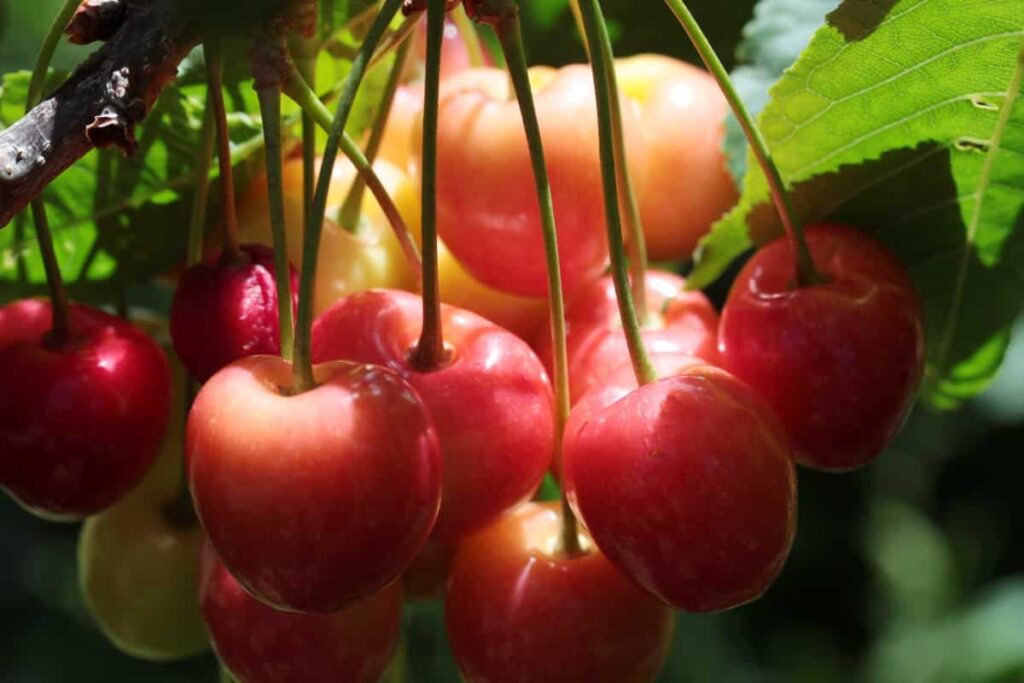
This helps maintain a healthy soil ecosystem, benefiting your Cherry tree and surrounding vegetation. Regularly fertilizing your Cherry trees helps maintain a balanced supply of these vital nutrients in the soil. It provides the necessary elements for healthy root development, which promotes strong tree structure and efficient nutrient uptake. Fertilizer also enhances flowering and fruiting by providing the energy needed for blossoms to form into cherries.
Best Fertilizer for Cherry Trees
Organic Fertilizers for Cherry Trees: Benefits and Recommendations
Organic fertilizers offer a sustainable approach to nourishing Cherry trees. These fertilizers are derived from organic materials such as compost, manure, or plant-based ingredients. Fish emulsion is an excellent choice for organic fertilizer. Fish emulsion contains valuable nutrients like nitrogen and phosphorus that plants can readily absorb. Additionally, bone meal can provide a good source of phosphorus, which helps with flower production and fruit development.
In case you missed it: How to Grow Cherry Tomatoes at Home: from Seeds and Tomatoes in Pots, Indoors, and Planting, Care
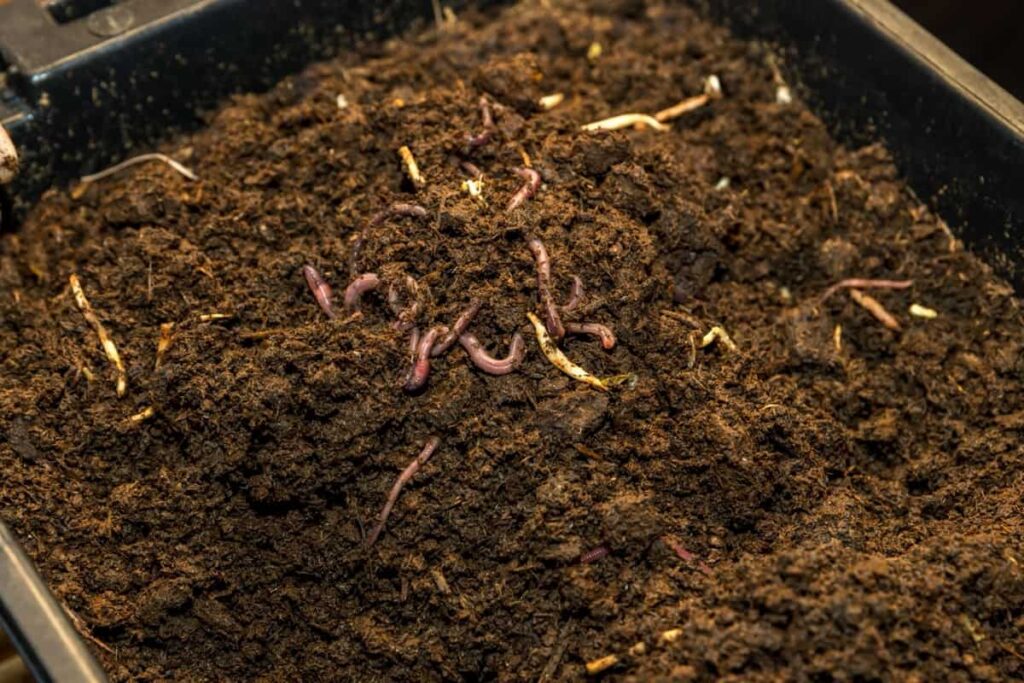
Natural Fertilizers for Cherry Trees: Enhancing Growth and Fruit Production
Compost is one of the top choices, which provides a rich source of soil organic matter and essential nutrients. By adding compost to the soil around your Cherry tree, you’ll improve its overall fertility and moisture retention capabilities. Additionally, worm castings are an excellent option as they contain beneficial microorganisms that enhance nutrient availability.
Another great natural fertilizer is seaweed extract. This organic product is packed with trace minerals and growth-promoting hormones that stimulate root development and boost fruit production in Cherry trees. Plus, it’s easy to apply through foliar spraying or incorporating it into the soil. Wood ash can provide potassium-rich benefits to your Cherry tree. Potassium plays a crucial role in plant water regulation while promoting disease resistance – both important factors in maintaining healthy cherries on your tree.
Homemade Fertilizers for Cherry Trees: Cost-effective and Environmentally Friendly Options
- Coffee grounds: Don’t throw away those coffee grounds. They can work wonders for your Cherry trees. Coffee grounds are nitrogen-rich, promoting healthy leaf growth and tree vigor.
- Lime: Lime is another fantastic option as it helps balance the pH levels of the soil, making it more suitable for Cherry tree growth. It also provides calcium, crucial for strong cell walls and disease resistance.
- Epsom salt: Epsom salt contains magnesium sulfate, an essential nutrient for plant chlorophyll production. It can help improve fruit quality and increase plant productivity.
- Wood ash: Wood ash from burnt hardwoods contains potassium carbonate, benefiting tree health and fruit development.
Preparing the Soil for Cherry Tree Fertilization: Tips and Techniques
Preparing the soil for Cherry tree fertilization ensures optimal growth and fruit production. Before applying any fertilizer, it’s important to assess the condition of your soil. Start by testing its pH levels to determine if any amendments are needed. Cherry trees thrive in slightly acidic to neutral soil, with an ideal pH range of 6.0-7.0.
Add elemental sulfur or peat moss to lower the pH if your soil is too alkaline. On the other hand, if it’s too acidic, you can raise the pH by incorporating lime into the soil. In addition to pH adjustments, improving the overall soil quality for Cherry tree health is essential. This can be achieved through organic matter enrichment. Adding compost or well-rotted manure helps increase nutrient content and enhances water retention capabilities.
In case you missed it: How Much Does Landscaping Cost This Year: Estimate Square Foot Rates and Prices for Backyard and Front Yard
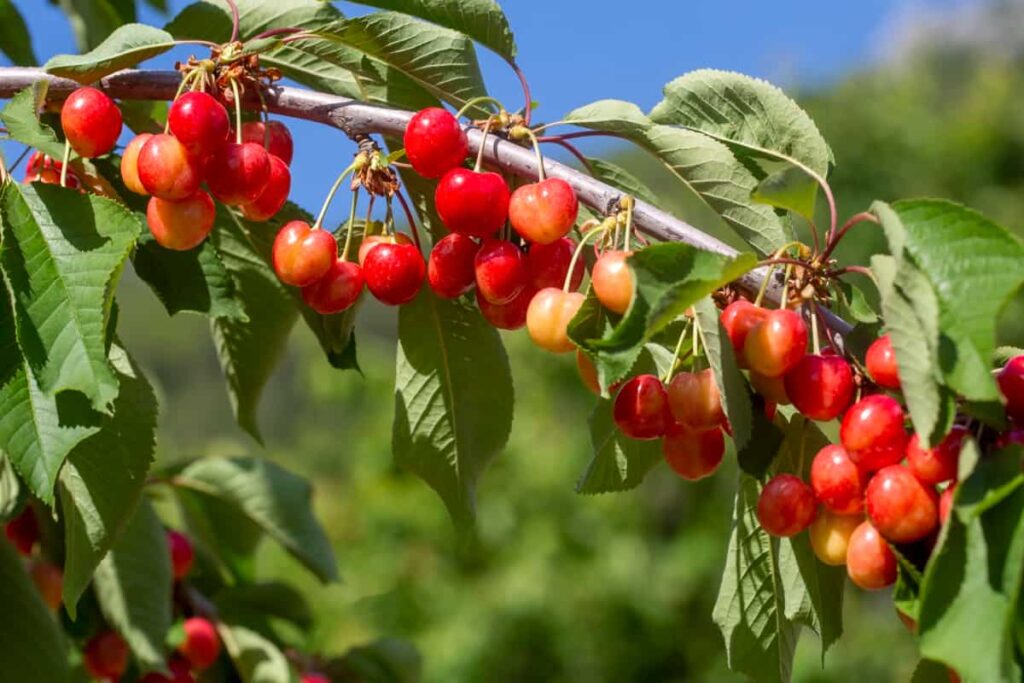
NPK Ratio for Cherry Tree Fertilization: Finding the Right Balance
Cherry trees are light feeders and prefer a low-nitrogen fertilizer such as 5-10-10 or 10-15-15. Cherry trees have specific nutritional needs, and finding the right nutrient balance is crucial for their growth and productivity. One important aspect to consider when fertilizing Cherry trees is the NPK ratio. Cherry trees are considered light feeders, meaning they do not require excessive nutrients compared to other fruit trees. These ratios indicate that the fertilizer contains less nitrogen and higher phosphorus and potassium levels.
In case you missed it: Disease Management in Cotton Farming: Strategies for Control and Prevention
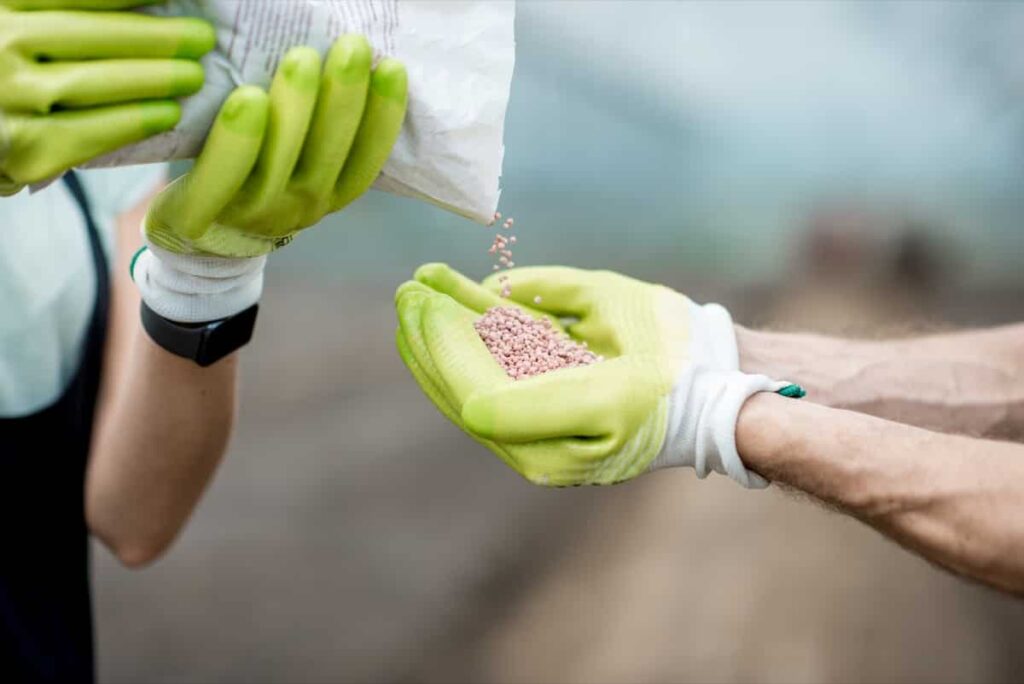
Nitrogen promotes leafy growth but can inhibit fruit production in Cherry trees. Using a low-nitrogen fertilizer can avoid an imbalance that may result in lush foliage at the expense of fruit development. Phosphorus is important for root development and flowering, while potassium enhances disease resistance and tree health.
When selecting a fertilizer with the appropriate NPK ratio for your Cherry tree, it’s important to consider its specific needs based on factors like soil composition, tree age, climate conditions, and any existing nutrient deficiencies. Consulting with a local horticulturist or agricultural extension service can provide valuable guidance tailored to your circumstances.
The Role of Nitrogen in Cherry Tree Fertilization
Nitrogen plays an important role in the Cherry tree’s growth and development. Nitrogen is primarily responsible for promoting leafy green growth in plants. It aids in producing chlorophyll, essential for photosynthesis, and is the process by which trees convert sunlight into energy. Cherry trees may exhibit stunted growth and yellowing leaves without an adequate nitrogen supply.
However, it’s important to strike a balance when applying nitrogen fertilizer to Cherry trees. Too much nitrogen levels can cause excessive vegetative growth at the expense of fruit production. This can result in weak branches that cannot support heavy loads of cherries or increase susceptibility to pests and diseases.
Phosphorus and its Impact on Cherry Tree Health and Productivity
Phosphorus is a vital nutrient for Cherry trees, crucial to their health and productivity. This essential element helps stimulate root development, ensuring strong anchorage and efficient water absorption. Additionally, phosphorus aids energy transfer within the tree, promoting healthy growth and fruit production.
One of the key impacts of phosphorus on Cherry tree health is its contribution to flower formation. Adequate phosphorus levels encourage abundant blossoms, ultimately leading to a bountiful harvest. Cherry trees may struggle to produce ample flowers without sufficient phosphorus, reducing fruit yield. Furthermore, phosphorus also plays a significant role in enhancing the quality of cherries.
It contributes to developing firm fruits with vibrant colors and improved flavor profiles. With proper phosphorous levels in the soil, Cherry trees are likelier to bear deliciously sweet and succulent, highly desirable cherries among consumers. To ensure optimal availability and uptake of phosphorous by Cherry trees, choosing fertilizers with an appropriate NPK ratio that includes higher levels of this nutrient is important. However, caution must be exercised not to over-fertilize excessively, as this can adversely affect tree health.
In case you missed it: Best Fertilizer for Plum Trees: Organic, Natural, Homemade, NPK Ratio, and Schedule
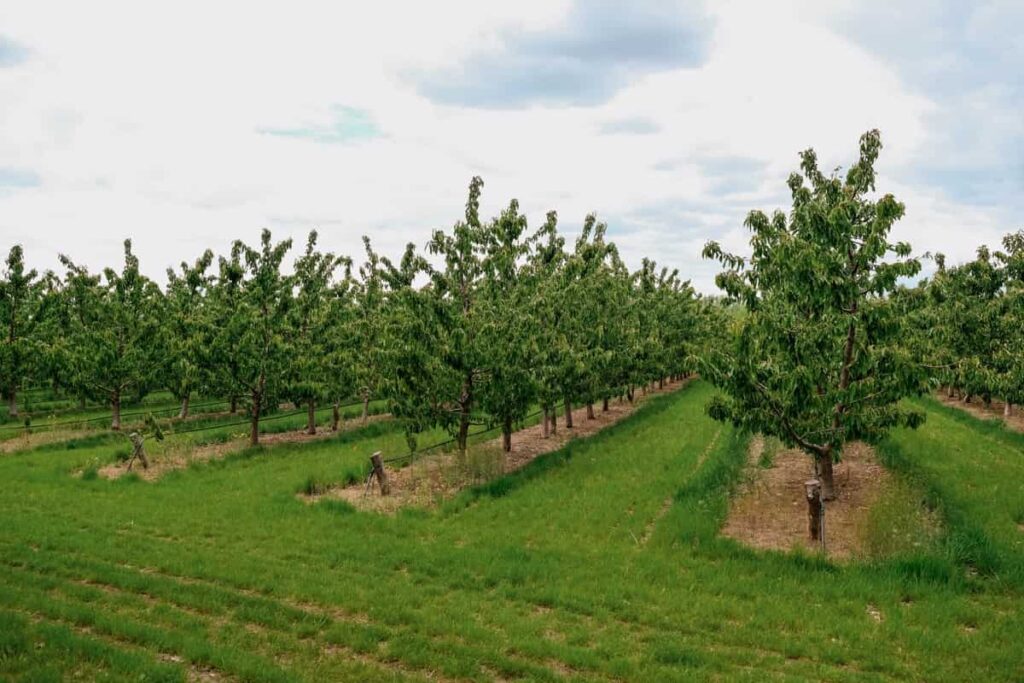
Potassium: A Vital Nutrient for Cherry Tree Growth and Disease Resistance
Potassium is vital in the Cherry tree’s growth, development, and ability to resist diseases. This essential nutrient helps with water regulation within the tree, improving its overall stress tolerance. Additionally, potassium aids in producing carbohydrates crucial for energy storage and fruit development. One of the key benefits of potassium for Cherry trees is its involvement in disease resistance.
Adequate levels of potassium help strengthen cell walls, making it more difficult for pathogens to invade and cause infection. This can make healthier trees less susceptible to common diseases such as bacterial canker or leaf spot. Furthermore, potassium promotes root development and improves nutrient uptake efficiency within Cherry trees. It facilitates absorbing and transporting other essential nutrients like nitrogen and phosphorus throughout the plant’s tissues.
By ensuring proper nutrient balance, potassium contributes to optimal growth and productivity. Consider using organic fertilizers rich in this mineral to ensure your Cherry trees receive sufficient potassium. Examples include wood ash or composted banana peels. Always follow recommended application rates based on soil test results to avoid over-fertilization.
Micronutrients for Cherry Trees: Ensuring Optimal Nutrition
Micronutrients play a crucial role in ensuring the optimal nutrition of Cherry trees. Though required in smaller quantities than macronutrients, these essential elements are vital for the tree’s growth and overall health. One micronutrient that is particularly important for Cherry trees is iron. Iron aids in chlorophyll production, which is necessary for photosynthesis and energy production.
A deficiency of iron can lead to yellowing leaves and stunted growth. Another micronutrient that Cherry trees require is zinc. Zinc promotes enzyme activity and helps with hormone regulation within the tree. It also plays a key role in fruit development and quality. A lack of zinc in trees can result in poor fruit set or malformed cherries. Manganese is another micronutrient essential for Cherry tree nutrition.
It assists with enzyme activation, carbohydrate metabolism, and nitrate assimilation. Manganese deficiency may cause interveinal chlorosis or necrosis on young leaves. Copper is critical for several processes within Cherry trees, including photosynthesis, respiration, protein synthesis, and lignin formation. Copper deficiency can lead to leaf curling or wilting and reduced fruit size.
Best Time to Fertilize Cherry Trees: A Seasonal Schedule
The timing of fertilizing Cherry trees plays an important role in overall productivity. Following a seasonal fertilization schedule ensures optimal growth and fruit production. The best time to fertilize Cherry trees is in early spring when they are starting to emerge from dormancy. During this period, the tree’s roots actively absorb nutrients, making it an ideal time to provide them with the necessary fertilizer.
Applying fertilizer in early spring gives the tree a boost of essential nutrients right when it needs them most. It’s important to note that over-fertilizing can be detrimental to Cherry trees. Applying too much fertilizer to the Cherry trees at the wrong time can result in excessive vegetative plant growth at the expense of fruit production. This is why following a seasonal schedule is crucial.
In addition to fertilizing in early spring, you may consider another application during late summer or early fall. This second application helps replenish any nutrient deficiencies that may have occurred in the growing season. By adhering to a seasonal schedule for fertilization, you can ensure that your Cherry trees receive the right amount of nutrients at key times during their growth cycle.
Applying Fertilizer to Cherry Trees: Dosage and Application Methods
Applying the right fertilizer to Cherry trees is crucial for their growth and productivity. To begin with, always follow the instructions provided by the fertilizer manufacturer. These guidelines will give you a general idea of how much fertilizer to use based on your tree’s size and age. Doing a soil test beforehand is also helpful to understand its nutrient composition and tailor your fertilizer application accordingly.
In case you missed it: Crop Harvest Calendar for California: Fruits and Vegetables in Season by Month Chart of California
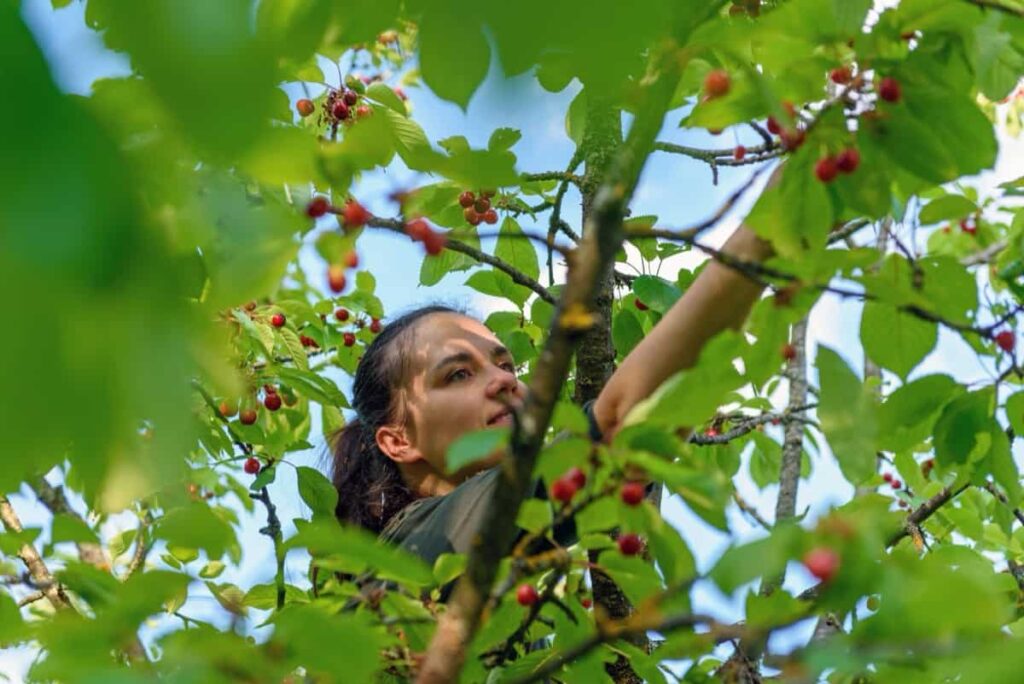
When applying granular fertilizers, spread them evenly around the base of the tree, starting from about 1 foot away from the trunk up to its drip line. Avoid piling up large amounts directly against the trunk, leading to root damage. For liquid fertilizers or foliar sprays, dilute them according to package instructions and apply using a sprayer or watering can. Make sure that both sides of the leaves are coated for optimal absorption.
Watering Considerations for Maximizing Fertilizer Efficiency in Cherry Trees
Watering is a crucial aspect of maximizing fertilizer efficiency in Cherry trees. Adequate watering ensures that the nutrients from the fertilizer are properly absorbed by the roots and utilized by the tree. It’s important to water deeply and evenly. This means providing enough water to penetrate the roots depth rather than just wetting the surface. Deep watering encourages deeper root growth and allows for better nutrient absorption.It’s best to water immediately after applying fertilizer or within 24 hours.
This helps dissolve and distribute the nutrients throughout the soil, making them readily available for uptake. Additionally, regular monitoring of soil moisture levels is essential. Cherry trees prefer moist but not saturated soil conditions; therefore, overwatering should be avoided as it can lead to tree diseases. Consider using mulch around your Cherry tree base. Mulching the tree helps retain moisture in the soil and reduces evaporation rates while preventing weed growth that could compete with your tree for nutrients.
Common Mistakes to Avoid when Fertilizing Cherry Trees
One of the biggest mistakes is over-fertilization. While it might seem like more fertilizer will result in healthier trees and bigger fruit, this is not always the case. Too much fertilizer can harm your Cherry trees by causing nutrient imbalances and burning the roots. Another mistake to avoid fertilizing Cherry trees is using the wrong type of fertilizer.
Cherry trees have specific nutritional needs, so choosing a fertilizer that meets those requirements is important. Timing is also crucial when fertilizing Cherry trees. Applying fertilizer too late in the season may stimulate new growth that won’t have enough time to harden off before winter, making your tree more susceptible to cold damage.
In case you missed it: Best Fertilizer for Cantaloupe: Organic, Natural, Homemade, NPK Ratio, and Schedule
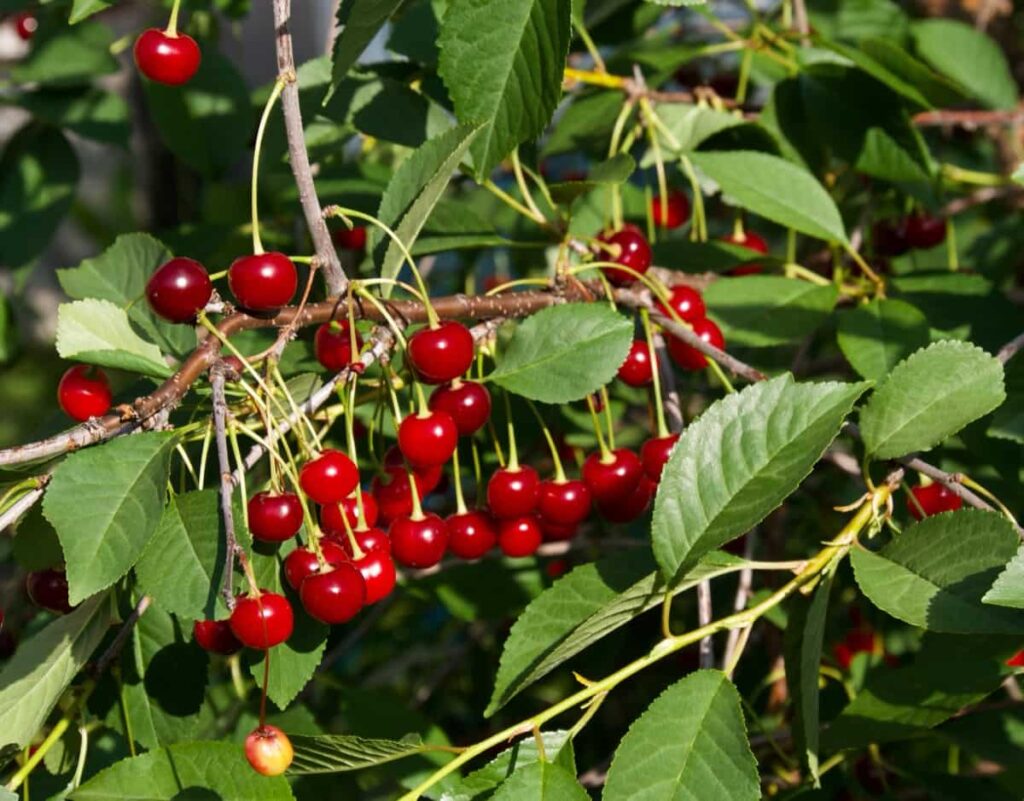
It’s also important not to neglect other aspects of tree care while focusing solely on fertilization. Proper watering practices and regular pruning are essential for maintaining healthy Cherry trees. Failing to read and follow instructions on the label of your chosen fertilizer product can lead to improper application rates or methods, which can be detrimental to your Cherry trees’ health.
Schedule for Fertilizing Cherry Trees
| Type of Fertilizer | Fertilizer Details | Best Time to Apply |
| Organic fertilizers | Fish emulsion, bone meal | In early spring |
| Natural fertilizers | Wood ash, seaweed extract, compost | In early spring, just as new plant growth begins. |
| Homemade fertilizers | Coffee grounds, Lime, Epsom salt, Wood ash. | Just before the buds start to bloom, in early spring |
| Micronutrients | Iron, Zinc, Manganese, Boron, Copper, Molybdenum | During early spring or fall |
Conclusion
Fertilizer is crucial in nurturing Cherry trees, ensuring they receive all the essential tree nutrients for healthy growth and abundant fruit production. Fertilizers supply essential nutrients that Cherry trees need to grow strong and healthy. Fertilizing Cherry trees also promotes increased fruit production. Adequate nutrient levels encourage the formation of more flowers during the blooming season.
- Management Pests and Diseases in Your Cotton Field
- Sheep Farming Business Plan for Beginners
- Aquaponic Farming at Home: A Step-By-Step Guide
- Profitable Village Farming Business Ideas in 2024
- High-Yield Aquaculture: Fast-Growing Fish for Farming
- Effective Fish Pond Construction Techniques for Beginners
- Irrigation and Water Management in Pineapple Farming
- Blossom to Harvest: Mastering Flowering and Pollination in Papaya Farming
- Pig Fattening Essentials: From Selection to Sale for Beginners
- Raising Wagyu Cattle: A Complete Guide for Premium Beef Production
- Soil Types and Their Water Holding Capacity
- Optimizing Irrigation Schedules for Coconut Groves for Enhanced Yield
- Espresso Your Garden: Coffee Grounds for Healthier Acid-Loving Plants
- The Best Soil Mix for Snake Plants: How to Mix Your Own Snake Plant Soil
- Green Thumb Success: Expert Tips for Cultivating Greenhouse Beans All Year Round
- Bloom All Year Round: The Ultimate Guide to Indoor Hyacinth Care
- Eco-Friendly Gardening: How to Make Liquid Fertilizer from Kitchen Waste
- Ultimate Guide to Grow Anise in Pots: Explore Seed Propagation to Harvesting
- Guide to Raising Chester White Pigs: Discover Breed Facts to Growth Management
- Mastering the Elegance: The Ultimate Guide to Weeping Cherry Tree Care, Planting, and Maintenance
- Ultimate Guide to Planting Garlic in Grow Bags: Growing Strategies for Beginners
- How to Fix Spider Plant Leaf-Related Problems: Natural and Organic Remedies
- 10 Reasons Why Your Tulsi Plant is Shedding Leaves: Home Remedies and Solutions
- Optimizing Growth and Yield: The Advantages of Palm Bunch Ash Fertilizer
- Utilizing Neem Oil Extract as a Natural Pesticide for Hydrangea
- From Soil to Harvest: Various Ways in Which Farmers Can Use AI Tools
- Steps to Encourage and Induce Citrus Flowers: A Comprehensive Guide
- How to Fix Snake Plant Leaf-Related Issues: Natural and Organic Remedies
- Transform Your Garden into a Fragrant Oasis with Raat Ki Rani (Night Blooming Jasmine)
- Discover the Ideal Chicken Breeds for Philippine Farms
- How to Create a Poultry Egg Farm Business Plan for Profits
- Grow Lemon Cucumbers Like a Pro: Insider Techniques for Bountiful Yields
- Ultimate Guide to Caring for Your Pink Princess Philodendron: Tips for Thriving Variegation
- Areca Nut Profit Per Acre: Calculating Yield and Cost of Cultivation
- How Kaveri Chicken is Becoming a More Profitable Breed in Indian Backyards
- Transform Your Barn: 9 Steps to Convert a Horse Stall into a Chicken Coop
